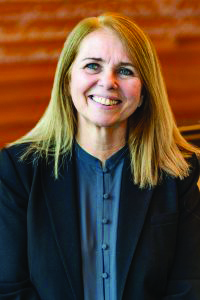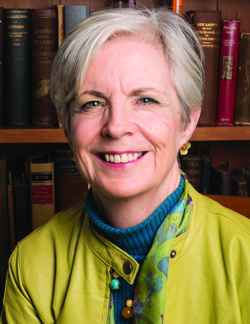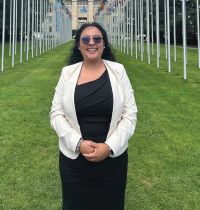Those who have participated in study abroad programs know that in addition to sightseeing and fun there are practical benefits as well.
Many schools offer study abroad programs that give students real-world experience through internships and externships. They may be in law firms, at nonprofit agencies or with courts.
They provide an up-close look at a foreign legal system in addition to unusual classes, cultural events and a chance to form lasting friendships and develop networks.
Beatriz Martinez Rios is a program assistant at American University Washington College of Law. She helps coordinate the War Crimes Research Office’s summer program in The Hague.
Rios said a study abroad program allows students to experience how different legal systems operate, particularly in the areas of international criminal law, humanitarian law and counterterrorism.
“This global perspective is critical for students who are seeking careers in multinational legal practices or international organizations,” she said. “These programs also offer networking opportunities with legal practitioners, judges and experts in international law, fostering connections that can lead to job placements and internships.”
Students also visit international courts and tribunals, where they witness legal principles being applied in real-world cases.
“Such experiences deepen their understanding of international legal frameworks, preparing them for complex legal challenges in their future careers,” Rios said.
Students also improve their research, analytical and cultural competence skills, which are crucial for navigating legal careers in a globalized world, Rios said.
“Exposure to diverse legal cultures and systems makes students more adaptable and better equipped to work in international or cross-border settings,” she said. “This enhanced adaptability, along with exposure to global legal trends, positions students to succeed in a variety of international legal roles after law school.”
More than 60 study abroad programs are offered by 45 law schools across the U.S. These programs are open to students outside of the host law school.
We gathered information from several program advisers who explained how important these experiences are in shaping law students’ outlooks and the trajectory of their careers.

Syracuse University College of Law’s Margaret Harding, professor and co-director of the LondonEx program; and Andrew Horsfall, assistant dean of international programs and co-director of the LondonEx program
Study abroad programs expose students to different legal systems, international clients and networking opportunities a student would not otherwise have. Students who complete a study abroad program return to the classroom with new perspectives, new ways of approaching the law and a better knowledge of how international laws influence U.S. law.
Students interested in pursuing a career in international law receive a foundation from which they can explore career options with first-person knowledge and contacts gained through the experience.
A study abroad program can also open the eyes of students who may not be thinking about careers in international law to new possibilities, while furthering their legal education.
The LondonEx program is a rich, immersive learning experience that cultivates a student’s interest in a career in international law. The school’s placements have included NGOs focusing on human rights, international law firms, criminal judges and the offices of various distinguished barristers and solicitors in London.
Through a series of lectures and discussions with London summer faculty, students learn about the practice of law in a global setting. The program includes a five-day orientation that explains English and international legal institutions and court structure, as well as allowing students to visit one of the Inns of Court and take a guided tour of “legal London.”
LondonEx students often describe the program as “transformative,” and they come away from the experience with a broader perspective on the legal profession as well as new skills that have been honed in a variety of practice settings.

Catholic University of America, Columbus School of Law’s Leah Wortham, director of the International Business & Trade Summer Law Program in Kraków, Poland
In today’s interconnected world, almost every U.S. lawyer’s work will touch the legal system of another country, whether it be regarding imported or exported goods and services, American investments abroad, foreign investments in the U.S., or other ways people’s family and business relationships cross national borders.
Study abroad helps students appreciate how other countries’ legal systems may differ from their own, as well as helping them learn to communicate with people from other cultures. Experience abroad, particularly work experience, strengthens a student’s résumé, as well as helping to establish lifelong professional and personal relationships in other countries.
More than 600 U.S. and 500 international students have participated in Catholic Law’s International Business & Trade Summer Law Program since its founding in 1992. With its strong European alumni base, the program can offer externships in top Polish law firms and in-house departments in the areas of arbitration, intellectual property, data protection, commercial contracts, corporate restructuring and reorganization, energy and natural resources, mergers and acquisitions, real estate and technology.
Few U.S. law students have a chance to participate in programs like this one after only one year of law school. The program’s four course offerings include Law of the European Union and International Investment Law, along with other subjects that are important to lawyers who work internationally.
While valuing the coursework and externship experience, program participants rank the transatlantic relationships formed at the top of the lasting benefits.
The program’s first week now coincides with U.S.-Central Eastern Europe Connection Weekend. The 2024 weekend offered a vibrant program on issues in ESG regulation and opportunities to network with almost 300 U.S. and European lawyers, business leaders, academics, government officials and others. Featured speakers included a U.S. Securities and Exchange commissioner, the assistant secretary of the U.S. Labor Department, the chair of the Polish equivalent of the SEC and an undersecretary of the Polish Ministry of Finance.
The topic for this summer’s meeting will be “Safeguards or Barriers? EU & U.S. Perspectives on Regulation.”

University of Missouri School of Law’s Rodney Uphoff, professor and director of the University of Missouri South Africa Educational Program
Studying abroad provides students with the opportunity to explore the legal system of another country and to dive deeply into the culture, history and life of its people. The experience helps students broaden their perspective and allows them to develop a better appreciation for the challenges other societies face.
In addition, students studying abroad often must navigate logistical challenges. Problem solving is a key lawyering skill, and that skill comes into play frequently when traveling abroad.
Finally, having a study abroad experience on your résumé helps when interviewing for jobs. It shows prospective employers a willingness to step out of your comfort zone, and it helps set you apart from other applicants.
Studying abroad in South Africa is especially helpful for advancing a legal career. Most students enter this program between their first and second years. They can earn six credits, which gives them more flexibility in their final two years of law school. They can take a lighter course load, which allows them to be on law review, participate in a clinic or work outside of school. And, with lighter course loads, they often are able to improve their GPAs.
The students in our study abroad program take three comparative courses. By comparing the South Africa criminal justice system with that of the U.S., for example, the students gain a better understanding of the positive and negative aspects of the U.S. system. The American students are especially enriched by debating with their South African classmates on issues that confound both systems. That broader perspective will serve them well, both during law school and in their careers.
Students find that prospective employers are eager to hear about their South African experiences, giving the students an excellent opportunity to sell themselves during an interview. Many students have said their South African study abroad experiences were the focus of their job interviews and led to getting their jobs.
Finally, studying in Cape Town is amazing not only because it is an incredibly beautiful, dynamic city but also because it is inexpensive, compared to Europe and the U.S. Simply put, for the money, it is the best place in the world to eat and drink.

American University Washington College of Law’s Beatriz Martinez Rios, program assistant for summer law program in The Hague
American University’s program in The Hague advances a student’s career by offering specialized courses in International Criminal Law and Counterterrorism, which provide a strong foundation in global legal issues. The program enables students to engage with leading practitioners from institutions such as the International Criminal Court and the International Court of Justice, offering unparalleled networking opportunities.
Students benefit from site visits to international tribunals, gaining insight into the judicial processes that shape international law. These experiences are invaluable for students pursuing careers in international law, human rights or humanitarian law. The opportunity to observe these institutions in action helps develop their professional perspectives.
The program includes a career panel and alumni networking opportunities, allowing students to explore job prospects and receive advice from professionals working in The Hague.
After the program, students can continue to develop their legal careers through research assistantships with the War Crimes Research Office, further enhancing their qualifications for roles in international legal fields. These opportunities further solidify the practical knowledge gained during the program and provide a pathway to meaningful, career-advancing roles in international law.
This article appeared in the 2025 Winter issue of The National Jurist along with a guide to summer study abroad programs by global region.
This post was originally published on this site be sure to check out more of their content.








